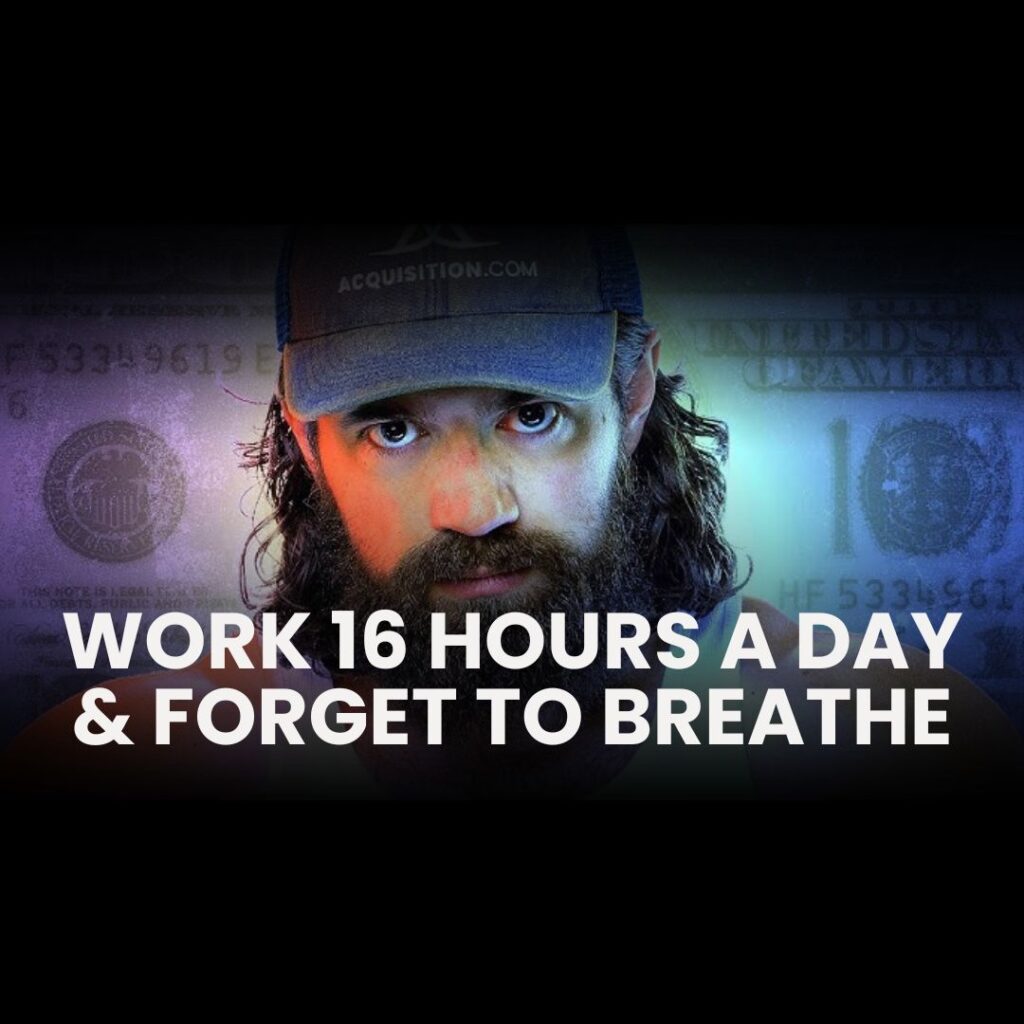According to researchers at Duke University, habits account for about 40% of our behaviors on any given day.
Understanding how to build new habits (and how your current ones work) is essential for making progress in your business, your health, and your life in general. They’re the small decisions you make, and the small actions you take every day.
Your journey today is the sum of your habits. How consistent you are? A result of your habits. How fit you are? A result of your habits. How profitable you are? A result of your habits.
What you repeatedly do forms your identity.
Success is the product of daily habits - not once-in-a-lifetime transformations.
- James ClearHow to Build a New Habit
Before diving into the 6 habits of highly effective people, it’s critical to understand how habits work.
But there’s a lot of information out there. Most of it is complex and hard to apply. To solve this problem and make things simple, I’ve curated James Clear’s framework for building new habits that actually stick.
Here’s the framework:
1) Start with an incredibly small habit
Make it so easy you can’t say no.
- Leo BabautaWhen most people struggle to build new habits, they say things like, “I need more motivation to act,” or, “I wish I had the willpower others have.”
This is the wrong approach.
Research shows that willpower is like a muscle. It gets fatigued the more you use it throughout the day. Motivation also comes in waves. It ebbs and flows. Rising and falling unpredictably. Stanford professor BJ Fogg calls this the “motivation wave.”
To solve this problem, focus on habits so small they don’t rely on motivation. Start with actions that feel too easy to fail.
Don’t write 7 posts a day. Write 7 posts a week. Don’t send 100 DMs a day. Send 10 DMs a day. Don’t train 6x a week. Train 3x a week.
Starting small means you cut friction. It allows you to create momentum. These micro-habits don’t need bursts of motivation. Just showing up. Over time, these small wins compound into big results.
2) Increase your habit in very small ways
Success is a few simple disciplines, practiced every day; while failure is simply a few errors in judgment, repeated every day.
- Jim RohnOne percent improvements, or one percent declines, compound over time.
The beauty of tiny gains is their ability to snowball. What starts as a simple habit (writing one post a day or training 3x a week) can transform into big results.
3) As you build up, break habits into chunks
If you continue improving 1% every day, you’ll see significant growth in a few months (without the risk of burnout). The key is to keep each habit reasonable and sustainable, so you can maintain momentum over the long term.
I’ll give you an example. If your goal is to spend 30 minutes engaging with your audience a day, do two 15-minute sessions. One in the morning. One in the evening.
If you want to write a long-form thread, break it into two sessions: Ideate and outline the thread in the morning. Write the body and the hook in the afternoon.
When you break down bigger goals into smaller chunks:
- You build persistence
- You make the process easier
It ensures you stay on track and steadily level up without feeling overwhelmed.
4) When you slip, get back on track quickly
The best way to improve your self-control is to see how and why you lose control.
- Kelly McGonigalHighly effective people make mistakes.
They commit errors. They get off track like everyone else. The difference is they bounce back and keep moving forward.
According to research, missing your habit once, no matter when it occurs, has no measurable impact on your long-term progress. Rather than trying to be perfect, abandon your all-or-nothing mentality.
If you missed a day of posting, that’s okay. Move forward. Just don’t miss twice. If you missed a day training, that’s okay. Move forward. Just don’t miss twice. You’re a human being. Learn from your errors. Don’t be harsh on yourself.
You shouldn’t expect to fail. But you should plan for failure. Think about what might disrupt your habits. What are some things likely to get in your way? What are some daily emergencies likely to pull you off course? How can you plan to work around these issues? How can you bounce back and get back on track quickly?
When you anticipate obstacles, you can create a plan to navigate them. If you know you might miss posting content because of travel, schedule your content in advance or batch-create posts beforehand.
You need to be persistent, not perfect. Focus on building the identity of someone who never misses a habit twice.
5. Be patient. Stick to a pace you can sustain
Patience is critical.
If you’re writing a newsletter, prioritize quality over quantity. Write one value-packed email per week. If you want to monetize, test small strategies before scaling. Have conversations with creators in your niche and engage with your followers to collect information and identify problems.
You can make incredible progress if you are both persistent and patient.
The 6 Habits of Highly Effective People

Highly effective people are systems thinkers.
They know success isn’t built on isolated actions but on the interplay of habits. By viewing their work as a system, they can identify weak points, optimize performance, and consistently create value.
But what’s systems thinking?
Let’s take for example, an old-school wrist watch. The kind with an hour and minute hand. A wrist watch is typically made up of many small parts that work together to keep and display time anywhere you go.
If you were to take a watch apart and lay the pieces all out on a table, you’d find springs, wheels, gears, gaskets, seals, rotors, etc. Once taken apart, the watch pieces are no longer a system because they are not working together for the purpose of telling time. Without the relationships, it’s just a collection of parts.
The same’s with habits. Without the relationship between them, it’s just a collection of habits. Each habit is interconnected with the others, all working to support and enhance one another.
Applying only three habits isn’t enough. If you want to build something exceptional in the long run without burning out or giving up faster than Usain Bolt, you need all of them.
So, here are the 6 habits of highly effective people (and how to apply them):
Habit 1: Learn
Anyone who stops learning is old, whether at twenty or eighty. Anyone who keeps learning stays young. The greatest thing in life is to keep your mind young.
- Henry FordI’m not talking about learning as in school. A place where teachers stifled your curiosity with the pressure to perform.
I’m talking about learning as a way to position yourself at the frontier of evolution and technology. Think about it. Humanity’s greatest achievements are the result of our collective capacity to learn. From the invention of the wheel to the creation of the internet. We went from primitive survival to global connectivity because of our ability to collect and apply knowledge.
When you embrace learning, you step into the flow of modern evolution. You shift from being a passive observer to an active participant in shaping the world.
But the kind of learning you might be thinking of (reading, listening, or watching) feels productive but it doesn’t lead to deep understanding. If you want to be a true learner, you need to switch from passive learning to active learning:
1) Teach what you’re learning to someone else. Like posting content on social media.
2) Challenge the material. Why does it work? What are its limitations? How does it connect to what you already know?
3) Immediately apply what you learn. If you’re learning to create content, publish posts daily. If you’re learning web design, design websites. Learning accelerates when theory meets practice.
Habit 2: Create
Be a creator and you won’t have to worry about jobs, careers, and AI.
- Naval RavikantTo create you need to become a creator.
The word creator comes from the Latin creare, meaning “to make” or “to bring forth.” To create is the most human thing we can do. It’s not a job. It’s not a title. It’s a fundamental part of existence. Doesn’t matter if you’re building businesses, or competing in the Olympics, you are a creator. Every decision, every action, every dream you chase… it’s all creation.
Create.
Create content. Create products. Create offers. Create value. Create pages, blogs, videos, newsletters. You’re here to bring ideas into existence and, in doing so, build a life that reflects your vision.
Every piece you create is a brick in the foundation of your freedom. Every action compounds. Every idea shapes your reality. The only path to irrelevance is to stop creating.
If you want to avoid criticism, create less.If you want to avoid irrelevance, create more.
- James ClearHabit 3: Rest

Hustle culture is fueled by the idea that productivity is directly proportional to hours worked: ”The harder and longer you work, the more opportunities you create. If you’re not grinding, someone else is, and they’ll outcompete you.”
They’ll tell you that resting is an excuse to be lazy or a luxury for those who don’t want to win.
And I understand those people. I hustled my way to where I am. But I never forgot about resting. Never. As an ex-football player, I know the importance of rest. I know how critical it is to rest to generate energy and force to perform better on the field.
Lions are the ultimate example of working smart, not hard. They spend 16-20 hours a day resting and focus their efforts on high-reward hunts. Lions hunt in short bursts of intense energy. They target specific prey when conditions are optimal. Often at night when they have the advantage.
Does that mean you need to rest for 16–20 hours a day? No. We are not lions. Lions have four primary responsibilities: hunting, protecting, breeding, and raising their young. They can afford to rest.
Humans can’t afford to rest for that long.
We have thousands of responsibilities:
- Social
- Career
- Survival
- Physical
- Financial
- Self-Actualization
- Societal and Global
- Emotional and Mental
The list of responsibilities never ends.
But here’s my point: rest isn’t laziness, it’s strategy. Rest is the foundation for long-term productivity, creativity, and resilience. Highly effective people, from athletes to entrepreneurs, understand this. They work like lions: intense bursts of energy followed by intentional recovery.
Eat like a lion. Work like a lion. Feel like a lion. Live like a lion.
- Naval RavikantRest allows you to return to your work with renewed energy and perspective. It makes those 4–6 hours of deep focus far more effective than 12 hours of exhaustion-fueled grind.
Even machines need downtime for maintenance. Humans are no different. Rest not only recharges you but also allows you to enjoy the fruits of your labor.
Here’s how to rest:
1) Define your work hours and stick to them. Avoid the temptation to always be “on.”
2) Sleep. Sleep. Sleep. 7-8 hours a day works for me. Analyze yourself.
3) Prioritize a few hours of focused work each day rather than spreading yourself thin over long, unproductive hours.
4) Disconnect from screens, notifications, and the constant barrage of information. Give your mind space to wander.
5) Rest doesn’t always mean doing nothing or playing games. Do stuff that recharge you, like walking, exercising, or hobbies.
Habit 4: Be Patient, But Move Quickly
Anything you have to do, get it done. Why wait? You’re not getting any younger. When you do these things, do them as quickly as you can and with your full attention so you do them well. Then be patient with the results because you’re dealing with complex systems and a lot of people. It takes a long time for markets to adopt products. It takes time for people to get comfortable working with each other. It takes time for great products to emerge as you polish away. Impatience with actions, patience with results.
- Naval RavikantHighly effective people understand that patience with results and impatience with actions is critical for success.
Here’s why:
1. Trust compounds over time.
Whether you’re working with someone, an audience, or a team, it takes time to build the kind of trust that enables high-impact work. The people who succeed in the long run stick with the same people, projects, or communities. They allow relationships to compound like interest. Over time, this trust reduces friction and allows for faster, bigger moves.
2. Successful people embrace iteration.
Your first piece of content, project, or product will likely suck. My first posts? They sucked. My first offer? Big time flop. But highly effective people understand that patience means sticking with the process. They test, learn, and adapt. They know that each iteration gets them closer to what works.
Habit 5: Follow Your Curiosity
Passion is one of the most romanticized ideas of our time. People are told to “follow their passion,” as if it’s a compass that will lead to a life of purpose. It’s a seductive idea. But when growth is slow and things get hard, passion says, “I don’t love this anymore. It’s too slow. Too hard. Let’s quit and find something new.”
That’s dangerous.
But curiosity is different. When things get hard, curiosity doesn’t give up, it asks, “How can we solve that problem? What new perspective can we explore?” This is the key to success in the long run.
Think of curiosity as a scavenger hunt. Each new clue leads you closer to something meaningful, but it’s the journey itself that makes it worthwhile. Passion is like a treasure map with an X marking the spot. It promises a grand prize. But what happens if you never find it? Or worse, what if you dig it up, only to realize it wasn’t what you expected?
Curiosity doesn’t hinge on a single destination. It finds value in every step, twist and turn. This mindset not only makes the process more enjoyable but also builds resilience. When you face obstacles with curiosity, they become opportunities to learn, not reasons to quit. This shift in perspective is what separates those who give up from those who succeed.
Habit 6: Practice Gratitude
Gratitude is riches.
Complaint is poverty.
- Doris DayWe can all complain for the rest of our lives:
”Oh, this guy is making more money than me.”
”Oh, this girl is gaining 1,000 followers a week.”
”Oh, it’s luck.”
”Oh, they pay for growth.”
”Oh, I’ll never be able to do it.”
”Oh, I don’t have the motivation to keep going.”
”Oh, I’m depressed and can’t create content today.”
But the result will be misery, agony, and jealousy.
I could spend all day complaining that Dan Koe is building a software company for creators and will probably sell it for 8–9 figures in the future. Or I could complain that Justin Welsh has made millions selling the kind of products I want to sell.
But what’s the end goal of that? To get anxious and depressed? To never change?
Complaint is poverty.
Gratitude is riches.
You need to be grateful that you were given two hands to write, create, make, innovate, and invent. You need to be grateful that people like Justin Welsh and Dan Koe exist because you can study their systems, processes, and strategies – and apply them to your own business and brand to grow faster. You need to be grateful that you’re alive and have the ability to build the life you want with just a phone or laptop.
Make it a habit: right after you wake up, take five minutes for gratitude and appreciation. You don’t have to write it down. Just go through the things you’re most grateful for in your head.
Here’s what I do: I wake up, take three deep breaths, and say what I’m grateful for. Practicing gratitude seems small. Like it’s nothing. But it’s the best motivational speech you can give yourself when you open your eyes. Any jealousy or worry you might have will disappear.
Make it a habit, and I promise you, you’ll have more motivation to keep going and make 2025 the year your family, your friends, and most importantly, your past self, will be proud of.
Thank you for reading!
J

